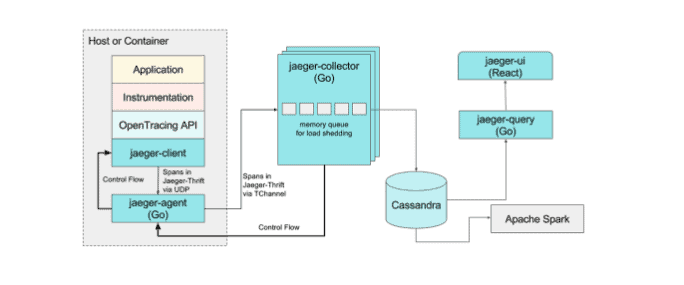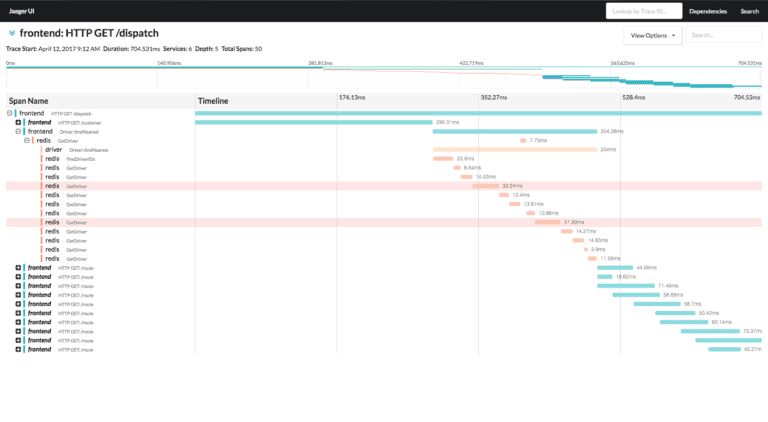Today, the Cloud Native Computing Foundation (CNCF) Technical Oversight Committee (TOC) voted to accept Jaeger as the 12th hosted project alongside Kubernetes, Prometheus, OpenTracing, Fluentd, Linkerd, gRPC, CoreDNS, containerd, rkt, CNI and Envoy.
“Microservices are a key component to cloud native computing and at scale require distributed tracing rather than traditional process monitoring. Distributed tracing allows developers the ability to understand what’s happening inside the flow of an application, which is why it’s a must-have for organizations monitoring their cloud native architectures,” said Chris Aniszczyk, COO of Cloud Native Computing Foundation. “Jaeger fits nicely in the software stack, as it already integrates with OpenTracing, Envoy and deploys on Kubernetes; We are looking forward to helping the Jaeger community grow and achieve deeper integration with other CNCF projects.”
Created by Uber Engineering, Jaeger is an open source distributed tracing system inspired by Google Dapper paper and OpenZipkin community. It can be used for tracing microservice-based architectures:
- Distributed context propagation
- Distributed transaction monitoring
- Root cause analysis
- Service dependency analysis
- Performance / latency optimization

Features
- OpenTracing compatible data model and instrumentation libraries in Go, Java, Node and Python. (OpenTracing is a CNCF project)
- Deployable on Kubernetes. (Kubernetes is a CNCF project)
- Uses consistent, dynamically adjustable upfront sampling
- Adaptive sampling per service/endpoint (coming soon)
- Post-collection data mining pipeline (coming soon)
- Pluggable storage backends
Technical Specs
- Backend components implemented in Go
- React/Javascript UI
- Cassandra 3.x, ElasticSearch as persistent storage (more storage backends coming soon)

“High velocity companies like Uber need scalable and performant distributed tracing systems to monitor and understand their architectures composed of thousands of microservices. Building Jaeger as an open source project allowed us to align with industry best practices and evolving standards like OpenTracing. It also attracted many great outside contributing companies like Red Hat,” said Yuri Shkuro, Staff Engineer at Uber and creator of Jaeger. “We look forward to the CNCF helping us attract more committers from other companies and spread the practice of distributed tracing in the industry.”
Uber began deploying Jaeger internally in 2015. It is now integrated into thousands of microservices and recording thousands of traces every second. The tracing system is used by companies like Base CRM, Circonus, FarmersEdge, GrafanaLabs, Massachusetts Open Cloud, Northwestern Mutual, Nets, Stagemonitor, Symantec, Red Hat, Uber, and Zenly. Additionally, companies like Red Hat are active contributors to the project. Jaeger is also used as the default tracing backend at OpenTracing Workshops at OSCON (Austin, May 2017), Velocity (San Jose, June 2017), Velocity (New York, Oct 2017).
Notable Milestones:
- 15 Contributors
- 1,215 Github stars
- 5 releases
- 263 commits
“One of the criticisms of microservice-based architectures is that they can become distributed monoliths: complicated, interdependent systems that tend to fail (or perform poorly) at once due to unforeseen interactions. In order to attack this problem, we must have the ability to follow code flow across services,” said Bryan Cantrill, TOC representative and project sponsor. “Building on the foundation of the CNCF OpenTracing project, Jaeger allows for cross-service observability in a way that is open and language-independent. Perhaps most importantly, Jaeger is borne from the experience of operating microservices in production: it is an exemplar of the production disposition that we in the CNCF are seeking to elevate and promote. We are thrilled to have Jaeger as a CNCF project!”
As a CNCF hosted project, Jaeger will be part of a neutral foundation aligned with technical interests, receive help with project governance and be provided conference space to reach a wider audience. CNCF will also assist with Jaeger marketing and documentation efforts.
For more on Jaeger, read Evolving Distributed Tracing at Uber by Shkuro, where he explains the history and reasons for the architectural choices made in Jaeger. Also check out Shkuro’s Monitorama PDX 2017 talk or this video of his briefing on Distributed Tracing with Jaeger & Prometheus on Kubernetes at Red Hat’s OpenShift Commons. Jaeger will also have a technical salon at KubeCon + CloudNativeCon North America 2017 in Austin on December 6.
Stay up to date on all CNCF happenings by signing up for our monthly newsletter.